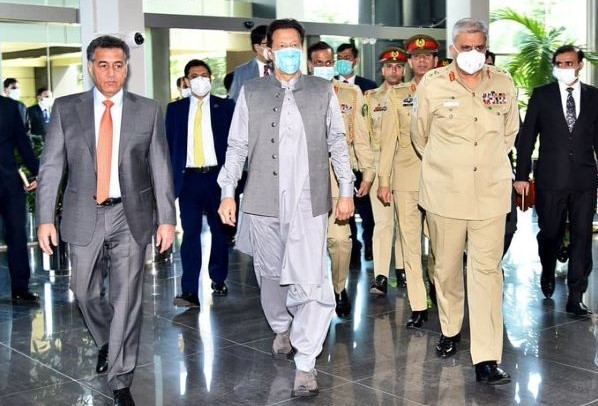
R Krishna Das
It may sound ironic, but Pakistan’s Prime Minister Imran Khan was unaware about the appointment of the new Inter-Service Intelligence (ISI) Chief—country’s most sensitive agency.
The Inter-Services Public Relations (ISPR), a wing of Pakistan Armed Forces announced the name of the officer to be the next ISI Chief. But the Prime Minister Office (PMO) had some reservations and Imran Khan has reportedly refused to notify the appointment.
At a time when Pakistan is struggling to contain insurgency in the aftermath of the Taliban takeover in neighbouring Afghanistan, the country is desperate to keep its most crucial house in order.
Last week Gen Qamar Javed Bajwa, chief of the army staff, took a file and held a lengthy discussion with the Prime Minister Imran Khan over the names shortlisted for the ISI Chief. In the capacity as the army chief, he had by then already finalised who would be the next Director General (DG) of the ISI and only wanted the PM’s nod. According to sources, the meeting ended on a less-than-agreeable note.
The army chief collected the file, walked down to his car and drove off to Rawalpindi.
A few hours later, the Prime Minister’s Office was taken aback when it heard that the ISPR had announced the appointment of Lt Gen Nadeem Ahmad Anjum as the new DG ISI, replacing Lt Gen Faiz Hameed. The PMO did not react instantly but communicated within 48 hours that PM Khan would not sign the notification because he had not agreed to the name announced.
The Pakistan Armed Forces tried to twist the issue and set a narrative that soon after the army chief had left from his meeting with the PM, one senior official in the PMO dialled a number in Rawalpindi and asked the officer to convey the Prime Minister’s message to the army chief that he (PM) was okay with the name that General Bajwa had recommended. The army said based on the information, the ISPR made the official announcement.
Now the question arises, how within an hour Imran Khan changed his mind? Secondly, it was such a sensitive issue and the PMO should have directly communicated it to General Bajwa.
The Prime Minister now had to make a decision but the issue had become more complicated. Khan wants Lt Gen Faiz to continue for a few more months. The Prime Minister is in a dilemma.
If he approved the name of someone other than the one already announced, he would reject the candidate not only recommended but officially announced by the military. This could, and probably would, rip a hole in the ‘same page’.
If he selects the one already announced, why did the issue have to be conflated into a crisis? And why run the risk of creating a breach when none was needed, and could be afforded?
If he opts for option 2, and the government argues he forced the army chief’s hand to ensure that proper procedures were respected, this narrative would only aggravate the situation further.
Interior Minister Sheikh Rashid Ahmed on Friday said the issue of appointment of new Inter-Services Intelligence (ISI) director general would be resolved within a week but was reluctant to give reasons for the delay.



